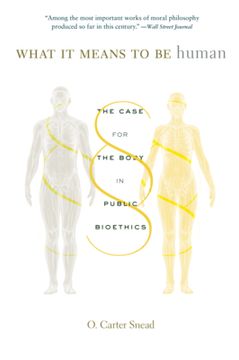Share
What it Means to be Human: The Case for the Body in Public Bioethics
O. Carter Snead
(Author)
·
Harvard University Press
· Paperback
What it Means to be Human: The Case for the Body in Public Bioethics - Snead, O. Carter
£ 17.96
£ 19.95
You save: £ 2.00
Choose the list to add your product or create one New List
✓ Product added successfully to the Wishlist.
Go to My WishlistsIt will be shipped from our warehouse between
Wednesday, May 15 and
Thursday, May 16.
You will receive it anywhere in United Kingdom between 1 and 3 business days after shipment.
Synopsis "What it Means to be Human: The Case for the Body in Public Bioethics"
A Wall Street Journal Top Ten Book of the YearA First Things Books for Christmas SelectionWinner of the Expanded Reason Award "This important work of moral philosophy argues that we are, first and foremost, embodied beings, and that public policy must recognize the limits and gifts that this entails."--Wall Street Journal The natural limits of the human body make us vulnerable and dependent on others. Yet law and policy concerning biomedical research and the practice of medicine frequently disregard these stubborn facts. What It Means to Be Human makes the case for a new paradigm, one that better reflects the gifts and challenges of being human. O. Carter Snead proposes a framework for public bioethics rooted in a vision of human identity and flourishing that supports those who are profoundly vulnerable and dependent--children, the disabled, and the elderly. He addresses three complex public matters: abortion, assisted reproductive technology, and end-of-life decisions. Avoiding typical dichotomies of conservative-liberal and secular-religious, Snead recasts debates within his framework of embodiment and dependence. He concludes that if the law is built on premises that reflect our lived experience, it will provide support for the vulnerable. "This remarkable and insightful account of contemporary public bioethics and its individualist assumptions is indispensable reading for anyone with bioethical concerns."--Alasdair MacIntyre, author of After Virtue "A brilliantly insightful book about how American law has enshrined individual autonomy as the highest moral good...Highly thought-provoking."--Francis Fukuyama, author of Identity
- 0% (0)
- 0% (0)
- 0% (0)
- 0% (0)
- 0% (0)
All books in our catalog are Original.
The book is written in English.
The binding of this edition is Paperback.
✓ Producto agregado correctamente al carro, Ir a Pagar.

